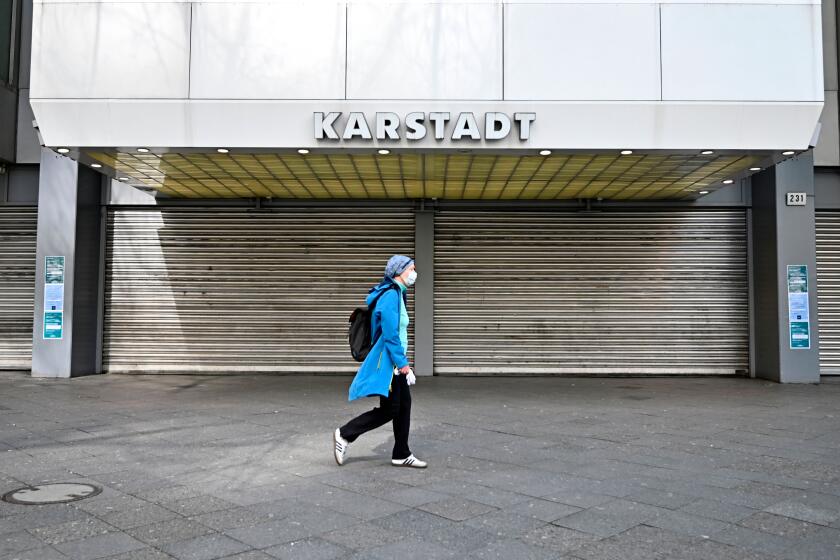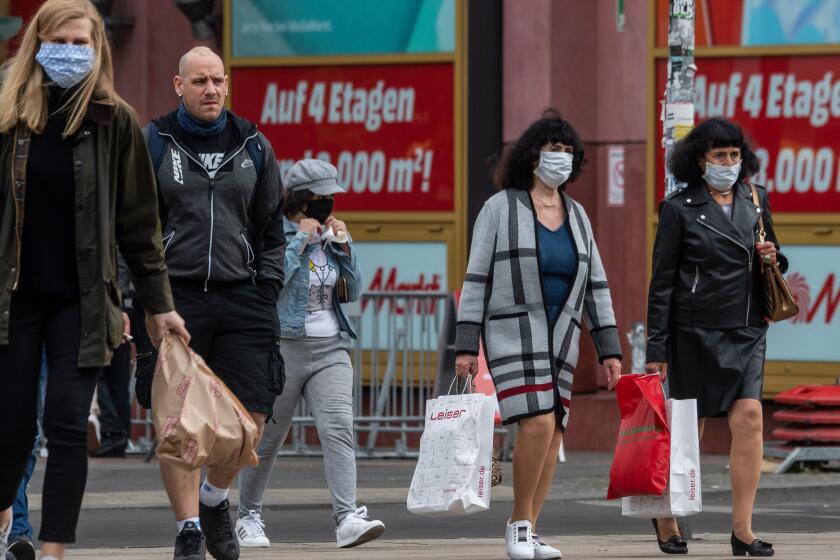Free travel around Europe could be a permanent casualty of the coronavirus, some warn

- Share via
BRUSSELS — The future of passport-free travel across 26 European countries is at risk if governments don’t soon ease the emergency border restrictions that they introduced to halt the spread of the coronavirus, European Union lawmakers and officials warn.
As the virus outbreak expanded in Italy in February, the country’s neighbors imposed border measures to keep infected people out, without any consultation. Others then followed suit until almost half the members of the zone known as the Schengen area had reintroduced border controls of some kind.
Free movement is one of the pillars of the European Union, and helps business flourish by allowing goods and people to seamlessly cross borders. The Schengen agreement has come under pressure before, as countries introduced border measures in response to the arrival of more than 1 million migrants in 2015 and to a series of extremist attacks. Some countries have kept those controls in place.
European officials fear that the coronavirus could be a nail in the coffin of friction-free movement across a zone that includes Germany, France, Italy and others.
“The risk we are facing seriously today is the death of Schengen,” Tanja Fajon of Slovenia, a leading EU lawmaker on the border measures, said Tuesday. “It is in a very poor and problematic state. It has been hit years ago by the refugee crisis, and the virus delivered another blow.
“We have to restore free travel as soon as possible once the pandemic is over,” Fajon added, calling on countries to consider whether the “very chaotic, selfish and egotistical approach at the borders” early in Europe’s coronavirus outbreak were worth it.
An already fraying European Union, faced with the coronavirus pandemic, comes under new pressures from nationalism as states assert their own powers.
On Wednesday, the EU’s executive arm, the European Commission, laid out its advice for lifting identification checks at hastily closed border crossings, hoping to salvage Europeans’ summer vacation plans and to get airlines, ferries and buses running while ensuring the safety of passengers and crew and preparing health measures for hotels to reassure clients.
“This is not going to be a normal summer, not for any of us,” Commission Executive Vice President Margrethe Vestager told reporters. “But when we all work together, and we all do our part ... then we don’t have to face a summer stuck at home or a complete lost summer for the European tourist industry.”
But a big question remains: Will the countries of the world’s biggest trading bloc follow the advice? Faced with a disease about which much is still unknown, national governments have tended to go it alone, and they — not the EU Commission — have the final say over their countries’ health and security matters.
The commission’s overarching advice is that EU countries with similar rates of coronavirus infections and comparably strong healthcare systems should begin lifting border measures between each other. Tourists from outside Europe will not be permitted to enter until at least June 15.
Germany’s leadership, history help stave off catastrophe from the coronavirus crisis — so far
Austria and Germany said Wednesday they plan to start loosening border controls this weekend after two months of restrictions. German Interior Minister Horst Seehofer said all border crossing points with France, Switzerland and Austria will be opened — compared with a select few currently. Border guards will no longer check all travelers, as they have been doing since March 16.
In a tweet, Austrian Chancellor Sebastian Kurz announced a shift starting Friday to “random checks at the German-Austrian border, and on June 15 the border should be opened again.” He said his government is looking to do the same “with Switzerland, Liechtenstein and neighboring countries in Eastern Europe, provided the infection numbers allow it.”
Even with border restrictions easing, social distancing rules would continue to apply, and the EU Commission is recommending that robust disease-monitoring measures are put in place, including large-scale testing capacity and contact tracing, so that people have the confidence to return to hotels and camping sites abroad.
Austria’s Tourism Minister Elisabeth Koestinger said Tuesday that “closed borders can’t be an ongoing situation. We have always pushed for considerations on how and under which conditions borders could be reopened,” according to Austria’s APA news agency.
In the past few weeks, Koestinger has pushed for the reopening of borders to countries that are as “successful in combating the coronavirus as Austria. This means that we — under continuous observation of infection figures — should go back to open border[s] step by step.”
Thousands of German tourists visit Austria each summer, and tourism accounted for 15.3 % of Austria’s gross domestic product in 2018.
EU Home Affairs Commissioner Ylva Johansson, however, warned that there can be no discrimination.
“Member states cannot open borders for citizens of one EU country but not for others. This is essential,” she told EU lawmakers last Thursday.
More to Read
Sign up for Essential California
The most important California stories and recommendations in your inbox every morning.
You may occasionally receive promotional content from the Los Angeles Times.












